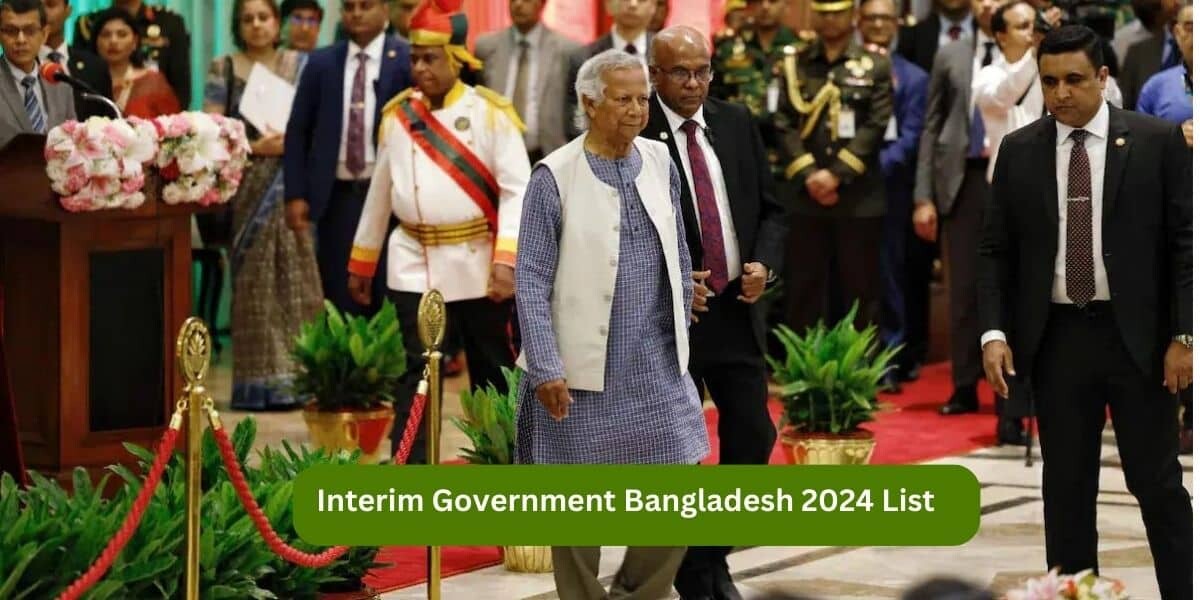Interim Government Bangladesh 2024 List: The formation of an interim government in Bangladesh in 2024 marks a significant political shift in the country. This change follows the resignation of Prime Minister Sheikh Hasina, who had been in power for 15 years. The announcement was made by the Chief of Armed Forces, General Waker-Uz-Zaman, amid widespread protests and political unrest.

Interim Government Bangladesh 2024 List
The political landscape in Bangladesh has been turbulent, with increasing dissatisfaction among the populace regarding the government’s policies and actions. The protests that led to the formation of the interim government began in early July 2024, primarily driven by students demanding a reduction in government job quotas assigned to descendants of Army veterans. These protests were met with violent crackdowns, internet blackouts, and curfews.
Formation of the Interim Government
On August 5, 2024, General Waker-Uz-Zaman announced the formation of an interim government following the resignation of Prime Minister Sheikh Hasina. This interim government is intended to stabilize the country and prepare for new elections. The announcement was made in a televised statement, urging all sides to remain calm and refrain from clashes and vandalism.
Key Members of the Interim Government
The interim government comprises various individuals from different sectors, aiming to ensure a balanced and fair administration. Here are some key members:
- General Waker-Uz-Zaman – Chief of Armed Forces and head of the interim government.
- Dr. Muhammad Yunus – Chief Adviser
- Dr. Salehuddin Ahmed – Adviser, former Governor of Bangladesh Bank
- Brigadier General (retd) M. Sakhawat Hossain – Adviser, former Election Commissioner of Bangladesh
- Dr Md. Nazrul Islam (Asif Nazrul) – Adviser, law professor and civil society activist
- Adilur Rahman Khan – Adviser, human rights activist and founder of Odhikar
- Justice Md. Abdul Wahhab Miah (retired) – Adviser, former Chief Justice of Bangladesh
- Major General Syed Iftekhar Uddin (retired) – Adviser, former Inspector General of Prisons
- Dr Debapriya Bhattacharya – Adviser, economist and former Ambassador to the WTO and UN Office in Geneva
- Matiur Rahman Chowdhury – Adviser, journalist and editor-in-chief of Manab Zamin
- Dr Hossain Zillur Rahman – Adviser, economist and BRAC chairperson
- Justice M. A. Matin (retired) – Adviser, retired judge of the Appellate Division of the Supreme Court of Bangladesh
- Nahid Islam – Adviser, key coordinator of the Anti-discrimination Students Movement
- Asif Mahmud – Adviser, key coordinator of the Anti-discrimination Students Movement
- Rizwana Hasan – Adviser, Chief Executive of BELA
- A. F. Hassan Ariff – Adviser, former Attorney General of Bangladesh
- Md. Touhid Hossain – Adviser, former Foreign Secretary of Bangladesh
- Farida Akhter – Adviser, founding executive of UBINIG
Objectives of the Interim Government
The primary objectives of the interim government are:
- Stabilizing the Political Climate: Ensuring peace and order in the country by addressing the immediate concerns of the protesters and the general populace.
- Preparing for Elections: Organizing free and fair elections to establish a democratically elected government.
- Reforming Policies: Reviewing and amending policies that led to public dissatisfaction, particularly those related to job quotas and governance.
- Ensuring Transparency: Promoting transparency and accountability in government operations to rebuild public trust.
Challenges Ahead
The interim government faces several challenges:
- Maintaining Order: Ensuring that the protests do not escalate into further violence and that law and order are maintained.
- Economic Stability: Addressing the economic issues that have been exacerbated by the political unrest, including inflation and unemployment.
- Public Trust: Rebuilding trust among the citizens, who have become increasingly disillusioned with the government.
- International Relations: Managing diplomatic relations, especially with neighbouring countries like India, where the former Prime Minister Sheikh Hasina has reportedly taken refuge2.
FAQ: Interim Government Bangladesh 2024 List
Q1: Why did Prime Minister Sheikh Hasina resign?
A1: Prime Minister Sheikh Hasina resigned amid widespread protests and political unrest. The protests were primarily driven by dissatisfaction with her government’s policies, particularly regarding job quotas and governance.
Q2: Who is leading the interim government in Bangladesh?
A2: The interim government is being led by General Waker-Uz-Zaman, the Chief of Armed Forces.
Q3: What are the main objectives of the interim government?
A3: The main objectives of the interim government are to stabilize the political climate, prepare for free and fair elections, reform policies that led to public dissatisfaction, and ensure transparency and accountability in government operations.
Q4: What challenges does the interim government face?
A4: The interim government faces challenges such as maintaining order, addressing economic stability, rebuilding public trust, and managing international relations.
Q5: How has the public reacted to the formation of the interim government?
A5: The public reaction has been mixed. While some are hopeful that the interim government will bring stability and positive change, others remain sceptical and continue to demand more significant reforms.
